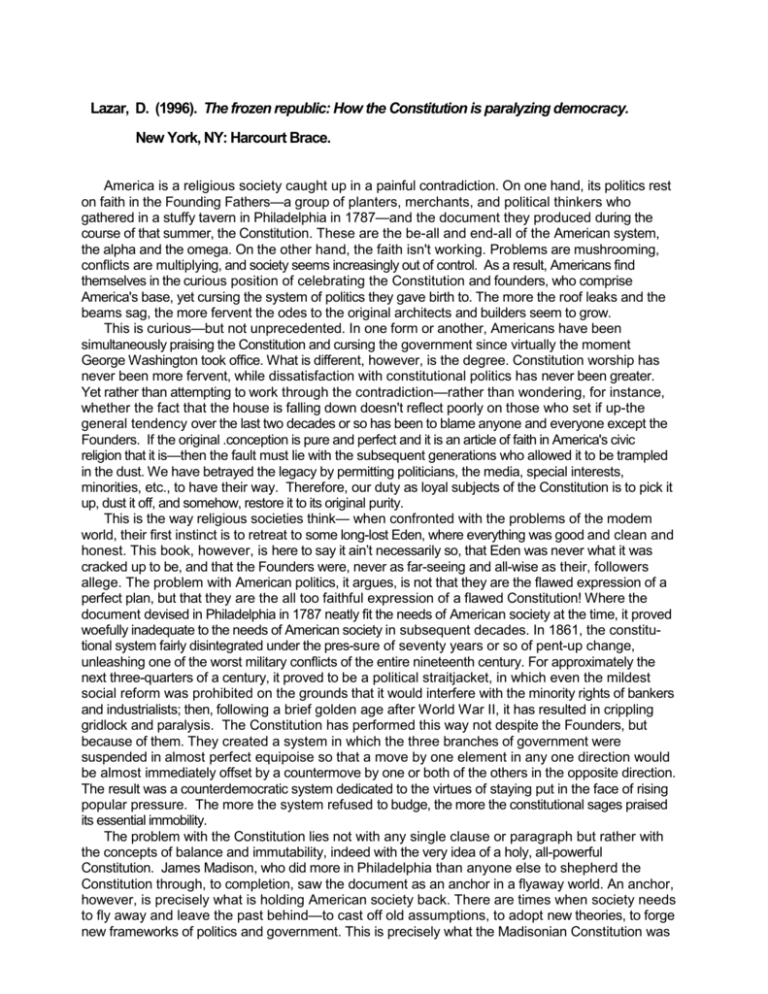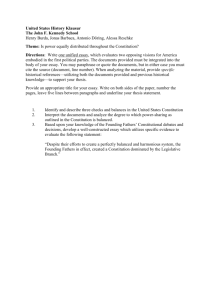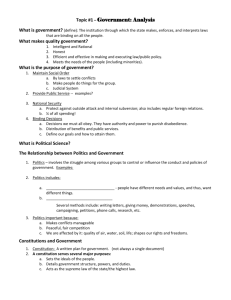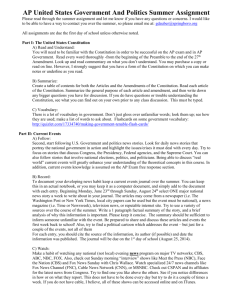How the Constitution is Paralyzing Democracy
advertisement

Lazar, D. (1996). The frozen republic: How the Constitution is paralyzing democracy. New York, NY: Harcourt Brace. America is a religious society caught up in a painful contradiction. On one hand, its politics rest on faith in the Founding Fathers—a group of planters, merchants, and political thinkers who gathered in a stuffy tavern in Philadelphia in 1787—and the document they produced during the course of that summer, the Constitution. These are the be-all and end-all of the American system, the alpha and the omega. On the other hand, the faith isn't working. Problems are mushrooming, conflicts are multiplying, and society seems increasingly out of control. As a result, Americans find themselves in the curious position of celebrating the Constitution and founders, who comprise America's base, yet cursing the system of politics they gave birth to. The more the roof leaks and the beams sag, the more fervent the odes to the original architects and builders seem to grow. This is curious—but not unprecedented. In one form or another, Americans have been simultaneously praising the Constitution and cursing the government since virtually the moment George Washington took office. What is different, however, is the degree. Constitution worship has never been more fervent, while dissatisfaction with constitutional politics has never been greater. Yet rather than attempting to work through the contradiction—rather than wondering, for instance, whether the fact that the house is falling down doesn't reflect poorly on those who set if up-the general tendency over the last two decades or so has been to blame anyone and everyone except the Founders. If the original .conception is pure and perfect and it is an article of faith in America's civic religion that it is—then the fault must lie with the subsequent generations who allowed it to be trampled in the dust. We have betrayed the legacy by permitting politicians, the media, special interests, minorities, etc., to have their way. Therefore, our duty as loyal subjects of the Constitution is to pick it up, dust it off, and somehow, restore it to its original purity. This is the way religious societies think— when confronted with the problems of the modem world, their first instinct is to retreat to some long-lost Eden, where everything was good and clean and honest. This book, however, is here to say it ain’t necessarily so, that Eden was never what it was cracked up to be, and that the Founders were, never as far-seeing and all-wise as their, followers allege. The problem with American politics, it argues, is not that they are the flawed expression of a perfect plan, but that they are the all too faithful expression of a flawed Constitution! Where the document devised in Philadelphia in 1787 neatly fit the needs of American society at the time, it proved woefully inadequate to the needs of American society in subsequent decades. In 1861, the constitutional system fairly disintegrated under the pres-sure of seventy years or so of pent-up change, unleashing one of the worst military conflicts of the entire nineteenth century. For approximately the next three-quarters of a century, it proved to be a political straitjacket, in which even the mildest social reform was prohibited on the grounds that it would interfere with the minority rights of bankers and industrialists; then, following a brief golden age after World War II, it has resulted in crippling gridlock and paralysis. The Constitution has performed this way not despite the Founders, but because of them. They created a system in which the three branches of government were suspended in almost perfect equipoise so that a move by one element in any one direction would be almost immediately offset by a countermove by one or both of the others in the opposite direction. The result was a counterdemocratic system dedicated to the virtues of staying put in the face of rising popular pressure. The more the system refused to budge, the more the constitutional sages praised its essential immobility. The problem with the Constitution lies not with any single clause or paragraph but rather with the concepts of balance and immutability, indeed with the very idea of a holy, all-powerful Constitution. James Madison, who did more in Philadelphia than anyone else to shepherd the Constitution through, to completion, saw the document as an anchor in a flyaway world. An anchor, however, is precisely what is holding American society back. There are times when society needs to fly away and leave the past behind—to cast off old assumptions, to adopt new theories, to forge new frameworks of politics and government. This is precisely what the Madisonian Constitution was designed to prevent and something it has succeeded all too well in doing. As a result, US society is laboring under what is at best an eighteenth-century mode of government as it prepares to enter the twenty-first century. America must cast off the constraints. At the same time, it has never seemed more unequal to the task. Society has never been more fragmented, politics have never been narrower or more shortsighted, while the extended constitutional priesthood judges, eminent professors of constitutional law, op-ed columnists, and so forth—has never been more dogmatic. Even as they try to choke each other to death, liberals and conservatives have never been more united in their devotion to the secular religion that supposedly holds society together but is in fact tearing it apart. They are like Catholic and Protestant theologians of the sixteenth and seventeenth centuries, each one claiming to be more faithful to the Word than the other. The outlook for reform seems grim as a consequence, which only makes it all the more necessary. What Americans need is less faith and more thought, less willingness to put their trust in a bygone political order and a greater realization that they, the living, are the only ones capable of maneuvering society through the storm. Instead of beginning with the Constitution as the essential building block, they should realize that there are no givens in this world and that all assumptions, beginning with the most basic, must constantly be examined and tested. This must seem very strange to readers who have been trained from childhood to think of the Constitution as America's rock and foundation, without which it would disintegrate into an unthinking mob. Yet constitutional faith is a form of thoughtlessness, since it means relying on the thought of others rather than on one's own. The alternative is to emancipate oneself from the past, to wake up to the realization that two centuries of struggling and fighting have not been for naught and that we know a few things the Founders didn't as a consequence. Rather than continually deferring to their judgment, it means understanding that we are fully competent to make our way through the modern world on our own. This is not to say we should ignore Madison, Jefferson, et al., merely that there is no reason we should feel bound by their precepts. In a sense, America has to fight what Jonathan Swift called "The Battle of the Books," a halfforgotten intellectual war that erupted in the l690s between those who argued that ancient authorities were superior: because they were ancient and those who contended that, thanks to progress and advancement, modern scholars knew more than ancient ones could ever have imagined and that there was no reason therefore to bow to their example. The argument raged for half a century, and if the ancients were not completely toppled in the end, at least they were dented. Latter-day Americans have got to take up arms as well against the eighteenth-century philosophes who wrote The Federalist Papers and created the Constitution and have been posthumously lording it over the United States ever since. The alternative is continuing breakdown and decay. Government in America doesn't work because it's not supposed to work. In their infinite wisdom, the Founders created a deliberately unresponsive system in order to narrow the governmental options and force us to seek alternative routes. Politics were dangerous; therefore, politics had to be limited and constrained. But America cannot expect to survive much longer with a government that is inefficient and none -too democratic by design. It is impossible to forge ahead in the late twentieth century using governmental machinery dating from the late eighteenth. Urban conditions can only worsen, race relations can only grow more poisonous, while the middle class can only grow more alienated and embittered. Politics will grow more irrational and self-defeating, while the price of the good life—that is, a nice home, good schools, a quiet street in a safe neighborhood— can only continue its upward climb beyond the reach of all but the most affluent. Rush Limbaugh, Howard Stern, and other demagogues of the airwaves will continue to make out like bandits, while the millions of people who listen to them will only grow angrier and more depressed. Eventually, every other Society caught up in such a bind has snapped. Sooner or later, the United States will as well. The stays have already begun to fray. Societies can regenerate, though. For those who know their English history (as all educated Americans did once upon a time), the example that springs immediately to mind is Britain in the early nineteenth century. After a quarter-century of intermittent warfare against revolutionary France, the British found themselves in a predicament not altogether different from that of the United States at the end of its half-century long crusade against the Soviet Union, The government was over its head in debt, the political structure fairly creaked with age, and even by modern standards, the political classes were amazingly stupid and corrupt. Rather than marching forward into the brave new world of the nineteenth century, the ruling class showed every sign of retreating into the tired old world of the eighteenth century, in which backwoods country squires slept with the hounds, and judges in horsehair wigs sentenced half-grown pickpockets to the gibbet. (British politicians of the early nineteenth century believed in the morally salutary effects of capital punishment even more fervently than American politicians do today). The ruling class was committed to the idea that the key to Britain's strength lay in its "Ancient Constitution" as the country's bundle of moss-backed political institutions and traditions was known. Britain had defeated Napoleon by sticking to the Ancient Constitution and, by jingo, it would defeat whatever the postwar era had to offer by doing so as well. But then the unexpected occurred—the immovable moved, the reformers grew louder and more insistent, the middle classes pricked up their ears and began to listen, and beginning in 1832, the country embarked on a program of deep-seated constitutional reform. The squirearchy retreated, while a new kind of politics gained a toehold, a kind of politics that was progressive, utilitarian, and broader based. Over the next few decades, Britain went from having the worst government in Europe to having the cleanest, the most efficient, and the most responsive. Rather than collapsing, something that most radicals (including Jefferson) thought was likely at any moment, the country-gained a new burst of life and went on to conquer the globe. Regeneration was inseparable from reconstitution. In order to pick itself up by the boot straps, British society had to overthrow the old idea, of an Ancient Constitution that was unknowable, unapproachable, miraculous, and unmoving, the political equivalent of the laws that Moses had brought down from the mountain top. The parallels with modern-day America could not be more obvious. The United States is also saddled with an ancient Constitution, the oldest in the world by now and one equally far removed from the needs of late twentieth-century society. It also has the worst form of politics in the advanced industrial world, (a belt extending from Western Europe across North America to Japan, New Zealand, and Australia), the most inefficient government, and the oiliest, most self-serving politicians. Since 1994, Congress has been in the grips of Republican zealots eager to return to the days of Ozzie and Harriet and Dwight D. Eisenhower. Police are more brutal than in any comparable country, prisons are filled to overflowing, and social policies in general grow harsher and more punitive with every passing year. Yet in no country is the range of accepted political debate more narrow. A prominent Anglo-American journalist named E. L. Godkin once remarked that the United States has, far outstripped the rest of the world in what are called "constitutional lawyers." Our judges and commentators have acquired the widest celebrity as skilled acid shrewd expounders of the organic law. Their application of its provisions to the complex phenomena of our social and political conditions have been marvels of ingenuity and erudition. But the examination and elucidation of the principles on which governments ought to rest, one of the highest and most interesting pursuits in which the human-understanding can engage, has generally been neglected.... Political speculation has been regarded as an occupation fit only for French or German "reds" or for boy debaters. Godwin wrote these words at the height of the Civil War. For a time, it appeared amid the passionate disorder of the 1860s that the country might actually follow his advice and embark on a program of thoroughgoing constitutional reform. But then the Radical Republicans faltered in the latter part of the decade and lost their grip, political energy began to recede, and the country returned to its prewar somnolence. If they are to emerge from their latest paralysis, Americans will have to resume the job they failed to finish in the 1860s. Rather than mindlessly cursing government and politicians, they will have to get to the bottom of the American predicament and figure out why politics in this country have grown so abysmal. Instead of rallying to this or that favorite son, they will have to figure out why even the best candidates wind up being defeated by the system they have vowed to change. Rather than relying on the Founding Fathers for answers, it means looking to themselves—to their own intelligence, their own analytical powers, their own creative abilities. As every schoolchild knows, the Founders had wanted a Constitution that would serve the people as "a safeguard against the tyranny of their own passions." As Supreme Court Justice Louis Brandeis put it in Myers v. US. (1926), "The doctrine of the separation of powers was adopted...not to promote efficiency but to preclude the exercise of arbitrary power"—which, put another way, meant that inefficiency was the price Americans had to pay for freedom and democracy. But there was a catch here. How was one to evaluate a system that was inefficient by design? What output criteria could one develop? If it was performing well, that is, efficiently, then it was performing in a way that was dangerous and threatening. If it was performing poorly, that is, inefficiently, then it was performing well. Bad was good and good was bad—a conundrum designed to stop even the most ardent reformer in his tracks. Essentially, Madison and his colleagues in Philadelphia had created a puzzle palace in which logic was turned on its head. Or, rather, they had employed a different kind of logic, a pre-industrial version that would prove incomprehensible to citizens of the industrial era. Rather than a simple, straightforward analysis, therefore, this book is arranged chronologically in an attempt to show why ideas like separation of powers and limited government acquired such a powerful hold on people in the eighteenth century and why they proved so difficult to dislodge—even though they were so obviously unsuited to the problems of the nineteenth and twentieth centuries. The basic theme is not only that the Constitution is out of date but that by imposing an unchangeable political structure on a generation that has never had an opportunity to vote on the system as a whole, it amounts to a terrible dictatorship by the past over the present. Americans are prisoners, in effect, of one of the most subtle yet powerful systems of restraint in history, one in which it is possible to curse the president, hurl obscenities at Congress, and all but parade naked down Broadway, yet virtually impossible to alter the political structure in any fundamental way. They live in a system not only of limited government, but of limited democracy, which is why politics of late have become so suffocating and destructive. It is like a prison with no guards and no walls, yet from which no one ever escapes. The answer is not less democracy—which is what term limits, a balanced-budget amendment, and other checks on legislative power represent-but more. Rather than checks and balances, the American people need to cast off constitutional restraints imposed more than two centuries ago and use their power as a whole to rebuild society as they see fit. This is not an invitation to lawlessness, but, quite the contrary, a call for the democratic majority to begin refashioning society along more rational and modem lines. Rather than less freedom, it is a plea for more, beginning with the freedom of the popular majority to modify its political circumstances in whatever way it sees fit. Rather than submitting to an immutable Constitution, Americans should cast off their chains and rethink their society from the ground up. They have nothing to lose- except one of the most unresponsive political systems this side of the former Soviet Union.








